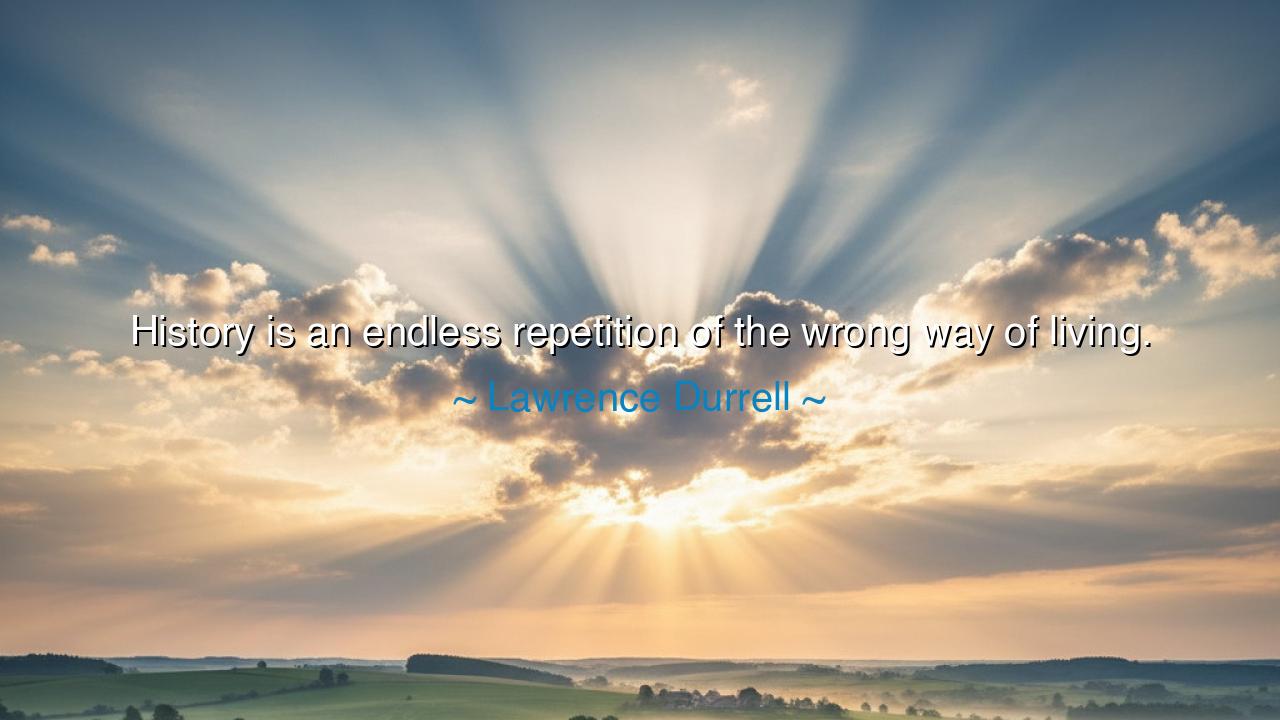
History is an endless repetition of the wrong way of living.






In the haunting and contemplative words of Lawrence Durrell, the poet and novelist of human contradiction, we hear a lament as ancient as civilization itself: “History is an endless repetition of the wrong way of living.” These words, carved not from cynicism but from insight, pierce through the illusions of progress and comfort. Durrell saw humanity for what it was—a species both magnificent and flawed, forever striving toward light yet bound to its own shadow. His words remind us that time does not heal the errors of the human heart; it merely reshapes them. What we call history is, in truth, the unbroken echo of our own mistakes.
The origin of this quote lies in Durrell’s reflections on the mid-twentieth century, a time of both awakening and devastation. He lived through two world wars, witnessing how nations, armed with knowledge and faith in modernity, descended into unspeakable violence. The world had learned much—but not enough. It had mastered the tools of science but forgotten the art of compassion. And so, in his deep irony, Durrell declared that history itself was a loop—a mirror reflecting the same follies in new disguises. He saw how men spoke of progress, yet still worshiped power; how societies preached peace, yet still sowed hatred. It was not the machinery of life that was broken—it was the human soul.
To call history “an endless repetition of the wrong way of living” is to confront a painful truth: that humanity’s greatest enemy is not ignorance, but forgetfulness. Every age swears it will learn from the last, yet each repeats the same errors with new justification. The wars of empires become the wars of ideologies; the greed of kings becomes the greed of corporations; the vanity of conquerors becomes the vanity of nations. The faces change, but the hunger for dominance, the blindness of pride, and the betrayal of virtue endure. We advance in knowledge, yet regress in wisdom. The world builds higher towers, yet its foundations grow weaker.
Consider the tragedy of the Roman Empire, once the pinnacle of order, culture, and law. Its citizens believed that Rome was eternal, that its prosperity and might were proof of divine favor. Yet beneath its marble temples, corruption spread. Power became excess; wealth replaced honor; the citizen forgot the common good. And so the empire fell—not from the blows of barbarians alone, but from the decay within. The same story has repeated across ages—from the fall of Athens to the decline of colonial powers, from the ashes of world wars to the crises of modern times. Each generation, believing itself enlightened, has stumbled into ruin by the same path: arrogance, division, and moral neglect. Thus, Durrell’s words are not judgment—they are a mirror, showing us the cycles we refuse to break.
Yet there is a deeper meaning in his lament. When Durrell says that history is repetition, he does not condemn humanity to despair. Rather, he calls upon us to awaken—to see the pattern, and by seeing, to rise above it. The “wrong way of living” is not inevitable; it persists only because we walk it blindly. To break the circle, we must learn not merely to remember, but to transform. Knowledge of the past is powerless without wisdom of the heart—that rare courage to choose mercy over vengeance, humility over pride, and understanding over fear. For the cycles of history are not written in stone; they are carved by our choices.
There have been moments when the pattern faltered—when the light broke through the fog of repetition. Think of Nelson Mandela, who, after twenty-seven years in prison, emerged not with hatred but forgiveness. In his choice, South Africa stepped away from the precipice of endless retribution. Think of Gandhi, who turned the violence of empire into the power of peace. Think of the civil rights marchers, who faced brutality with steadfast love. These were not perfect men and women, but they walked a different road—the road that breaks the chain of history’s blindness. They remind us that even in a world addicted to error, redemption is possible.
So, my children, hear this teaching: learn from the echoes of the past, lest they become the chorus of your future. Do not be content with progress of the hand if the heart remains unmoved. Seek wisdom that does not decay with time. When you see the world repeating its follies, do not say, “It has always been so,” and turn away. Instead, say, “It ends with me.” Live in such a way that your life becomes a counterpoint to the rhythm of destruction.
For in the end, Lawrence Durrell’s words are both warning and hope. Yes, history may repeat the wrong way of living, but each generation holds the power to compose a new song—to turn the weary march of time into a dance toward renewal. The past is a teacher, not a prison. Let us therefore rise, remembering its lessons not in despair, but in determination. For though humanity has long walked in circles, even the longest path can change direction when a single soul dares to walk differently.






AAdministratorAdministrator
Welcome, honored guests. Please leave a comment, we will respond soon